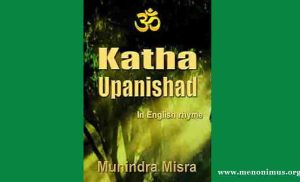Katha Upanishad | A Review
Katha Upanishad A Review
Katha Upanishad-A Review
Introduction
The ‘Katha Upanishad,’ one of the most revered and philosophically rich texts in the Upanishadic tradition, stands as a testament to the deep wisdom and spiritual insight of ancient India. Composed around 600 BCE, this Upanishad is a part of the Yajurveda and is notable for its profound exploration of life, death, and the nature of reality. In this review, we will delve into the key themes, teachings, and philosophical implications presented in the ‘Katha Upanishad.’
Synopsis:
The ‘Katha Upanishad’ unfolds as a dialogue between the young seeker Nachiketa and the deity Yama, the lord of death. The story begins with Nachiketa’s father, offering his son to Yama in a moment of anger, a decision that Nachiketa accepts with unwavering determination. Impressed by Nachiketa’s courage and seeking to impart spiritual knowledge, Yama engages in a series of profound discourses, leading Nachiketa on a journey of self-discovery and enlightenment.
Key Themes and Teachings:
The Impermanence of the Material World: The ‘Katha Upanishad’ emphasizes the fleeting nature of material existence and urges individuals to seek lasting fulfillment beyond the transitory pleasures of life. It asserts that the pursuit of worldly desires alone can never lead to true happiness.
The Eternal and Immortal Self (Atman): Central to the Upanishadic philosophy is the concept of Atman, the innermost essence of an individual that is eternal and unchanging. Yama imparts the knowledge that Atman is beyond the physical body, senses, and mind, and it transcends birth and death.
The Nature of Death and Immortality: Yama imparts a profound understanding of death, explaining that it is not the end of life but a transition of the physical body. He teaches that those who realize the immortal nature of Atman attain liberation (moksha) from the cycle of birth and death.
The Path of Knowledge (Jnana Yoga): The ‘Katha Upanishad’ advocates the path of knowledge as a means to realize the true nature of reality. It emphasizes the importance of self-inquiry, introspection, and the guidance of a realized teacher in understanding the deeper truths of existence.
Discernment of the Real from the Unreal: Yama introduces Nachiketa to the concept of the real (sat) and the unreal (asat) and teaches him to distinguish between temporary phenomena and eternal reality. This discernment is crucial for spiritual growth and liberation.
The Importance of Detachment: The Upanishad encourages a sense of detachment from transient desires and attachments. This detachment is not about renouncing the world but about cultivating a balanced and harmonious relationship with it.
Philosophical Implications:
The ‘Katha Upanishad’ has far-reaching philosophical implications that continue to resonate across cultures and time:
Metaphysical Understanding: The Upanishad’s teachings provide insights into the nature of reality, existence, and consciousness. Its emphasis on the unity of all beings and the transcendence of the material world holds significance in contemporary discussions about consciousness and interconnectedness.
Spiritual Seeker’s Journey: Nachiketa’s unwavering determination to seek higher knowledge reflects the archetype of the spiritual seeker who quests for deeper understanding amidst life’s challenges. This theme remains relevant for individuals on their spiritual journeys today.
Inner Transformation: The Upanishad’s emphasis on self-realization and inner transformation underscores the idea that true change begins within. Its teachings continue to inspire individuals to explore their inner depths and cultivate higher virtues.
Relevance in Modern Life: In a world often dominated by materialism and distraction, the ‘Katha Upanishad’ reminds us of the importance of seeking lasting fulfillment and embracing a balanced and purposeful life.
Conclusion:
The ‘Katha Upanishad’ stands as a timeless masterpiece of spiritual and philosophical wisdom, offering profound insights into the nature of existence, self-realization, and the pursuit of ultimate truth. Its teachings continue to guide seekers and thinkers on a transformative journey of self-discovery, making it a treasure trove of knowledge that remains relevant and enlightening even in the modern age. 0 0 0.
Katha Upanishad A Review
Read More: Tips for Writing Essay
N. B. The article ‘Katha Upanishad A Review’ originally belongs to the book ‘The Reviews of Epic Literature Around the World Vol-I‘ by Menonim Menonimus.








